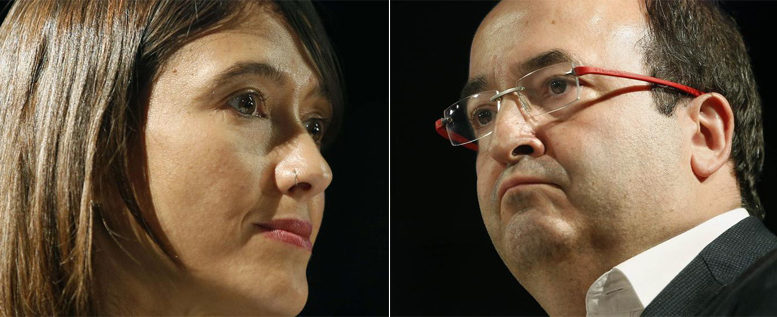• Current leader Iceta faces off against Gramanet mayor Parlón in tight race
• Both candidates pledge to reverse PSC’s decade-long slide in electoral fortunes
It’s official: whoever wins the internal election Saturday for leadership of the Party of Catalan Socialists (PSC-PSOE), both candidates to become the next leader of the Catalan affiliate of Spain’s federated Socialist party (PSOE) have pledged they will order the party’s deputies in Congress to vote “No” on whether or not to allow acting-Prime Minister Mariano Rajoy of the conservative Partido Popular (PP) to form a new government.
Saturday’s balloting of more than 17,000 PSC members pits the 56-year-old current PSC general secretary Miguel Iceta, who was a staunch supporter of ousted PSOE general secretary Pedro Sánchez, against the first vice-secretary of the party and former Catalan regional deputy Núria Parlón, the 43-year-old mayor since 2009 of Santa Coloma de Gramanet, a city of 117,000 on the outskirts of Barcelona.
Both candidates have pledged to turn around the electoral fortunes of the PSC, which has seen its share of PSOE deputies in the national Congress slide dramatically from a high point of 25 congressional seats in 2008, to 14 in 2011, 8 following the November 2015 general election and just seven seats after the second-round 26th June general election. Liikewise, the party’s representation in the Catalan regional Parlament has fallen from 42 seats in 2003 to just 16 seats in the current session.
The slide in electoral support for the PSC predates the emergence of anti-austerity party Podemos (We Can) nationwide in 2014 and is largely correlated to the rise over the past decade of Catalan nationalism, fueled sharply since 2011 by the Rajoy administration’s intransigence toward negotiating greater fiscal and political autonomy for Catalonia. Also at issue has been the PSC’s inability to persuade the national PSOE party, largely dominated by the powerful Andalucian affiliate party, to allow it to articulate a response to Catalan nationalism that could include reform of Spain’s 1978 constitution that would enable some type of referendum on Catalan independence.
With a Catalan nationalist majority now pushing hard for independence from Spain, Iceta argues in a guest column in the daily La Vanguardia newspaper today that a strong presence under his leadership in the Catalan Parlament is critical to the party’s ability to survive and guide Catalonia forward toward a reasonable, negotiated settlement of the nationalist issue. Parlón, meanwhile, argues in her own guest column in La Vanguardia that Catalan Socialists need to make their case more forcefully to the electorate, becoming a more militant, grassroots party that articulates a forward-looking, socialist vision for the party and for Catalonia within a federal Spain.
► Read More in Spanish at Europa Press and El País …
► Read Miguel Iceta’s Guest Column in Spanish at La Vanguardia …
► Read Núria Parlón’s Guest Column in Spanish at La Vanguardia …


